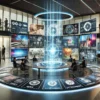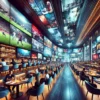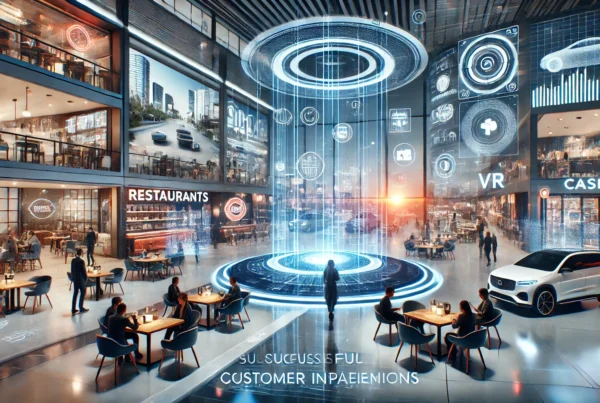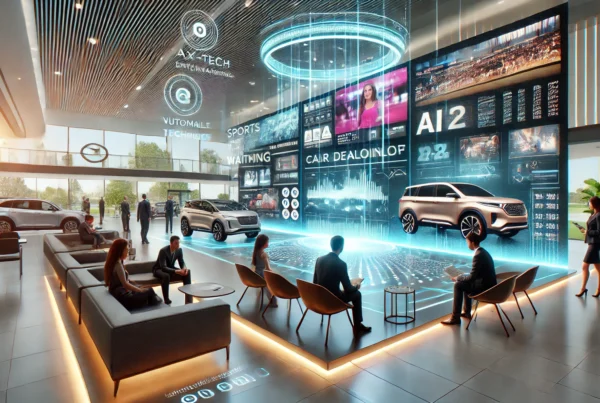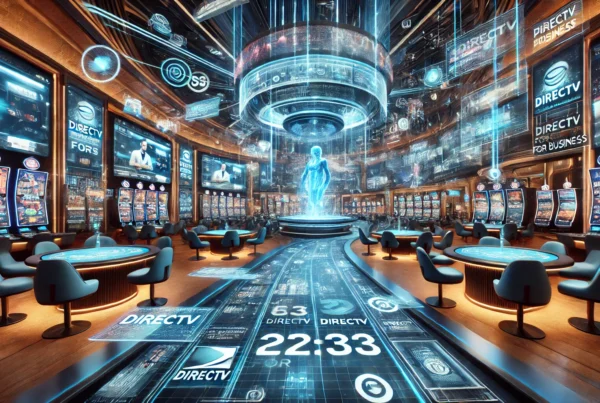Welcome to the future of on-premise entertainment, where cutting-edge innovations are transforming the landscape as we know it. Imagine walking into a restaurant or casino and being greeted by a world where augmented reality and advanced streaming solutions bring experiences to life in ways never seen before. These technologies are not just enhancing the ambiance; they are setting new standards for customer engagement and satisfaction.
For business owners and decision-makers in the hospitality, gaming, auto, and private office sectors, understanding and adapting to these emerging technologies is crucial. As venues strive to captivate tech-savvy audiences, integrating tools like virtual reality and personalized digital content becomes a game-changing strategy. According to Deloitte, augmented reality is becoming a key differentiator in competitive markets, offering businesses a way to stand out and attract new customers.
This blog post will explore how these innovations are revolutionizing the industry, from creating immersive environments to leveraging data-driven personalization. You’ll discover how businesses like your own can harness these trends to deliver exceptional experiences that keep customers coming back. Join us as we delve into the transformative power of emerging technologies in on-premise entertainment and uncover strategies to turn your establishment into a hub of excitement and innovation.
Ready to dive into the future of entertainment? Let’s explore how these technologies can elevate your business and redefine customer engagement.
Virtual Reality: Transforming Entertainment Experiences
Virtual Reality (VR) is revolutionizing on-premise entertainment, offering immersive experiences that captivate audiences like never before. As venues like casinos, bars, and lounges integrate VR, they are not only enhancing customer engagement but also setting new standards in the entertainment industry. According to PwC, the VR industry is projected to grow by 30% annually, underscoring its potential to reshape entertainment landscapes. This growth is driven by VR’s ability to attract tech-savvy audiences and increase dwell time, making it a valuable tool for businesses aiming to stay competitive.
VR technology creates immersive environments that transport users to different worlds, offering experiences that are both engaging and memorable. For instance, casinos can simulate the bustling atmosphere of a Vegas casino floor, complete with authentic sights and sounds. Such experiences not only attract younger audiences but also enhance traditional gaming experiences, making them more appealing to a broader demographic.
VR in Casinos and Venues
Casinos and hospitality venues are at the forefront of adopting VR technologies to enhance customer experiences. By offering VR gaming zones, casinos can provide guests with unique entertainment options that go beyond traditional gaming. These VR experiences can simulate various environments, from exotic locations to fantasy worlds, providing a thrilling escape for visitors.
In the hospitality sector, restaurants and bars are leveraging VR to create unique dining experiences. Imagine enjoying a meal while virtually visiting a vineyard or exploring a bustling cityscape. These immersive experiences can significantly boost customer engagement and satisfaction, encouraging repeat visits and positive word-of-mouth.
Case Studies: Successful VR Implementations
Several venues have successfully integrated VR into their operations, setting benchmarks for others in the industry. For example, the MGM Grand in Las Vegas has implemented VR gaming zones that offer guests a thrilling and immersive experience. This initiative has not only increased foot traffic but also enhanced the overall guest experience, leading to higher retention rates.
Similarly, the automotive giant BMW has adopted VR in its showrooms, allowing customers to explore and customize vehicles virtually. This has streamlined the sales process and improved customer satisfaction by providing a more personalized experience. These examples highlight the potential of VR to transform the on-premise entertainment landscape, offering businesses innovative ways to engage their audiences and drive growth.
The Future of VR in On-Premise Entertainment
As the VR industry continues to grow, its applications in on-premise entertainment are expected to expand even further. Businesses that embrace VR technology can offer unique experiences that differentiate them from competitors, attracting tech-savvy customers and encouraging longer visits. By staying ahead of the curve, these venues can not only enhance customer satisfaction but also drive business growth in an increasingly competitive market.
For more insights on how emerging technologies like VR are transforming the entertainment industry, explore our other articles on Sports Direct.
Augmented Reality: Enhancing Real-World Interactions
In the realm of emerging technologies in on-premise entertainment, Augmented Reality (AR) stands out as a transformative force. Unlike virtual reality, which immerses users in a completely digital environment, AR overlays digital content onto the real world, creating a seamless blend of the physical and digital. This technology is revolutionizing how businesses engage with customers, offering enriched experiences that captivate and engage.
AR is particularly impactful in venues such as auto dealerships, restaurants, and entertainment hubs. According to Deloitte, AR is becoming a key differentiator in competitive markets, providing businesses with innovative ways to stand out. By enhancing real-world interactions, AR not only boosts customer satisfaction but also fosters deeper engagement, making it a vital tool for businesses aiming to thrive in today’s tech-driven landscape.
AR Applications Across Industries
AR’s versatility allows it to be applied across various industries, each benefiting uniquely from its capabilities. In the auto industry, dealerships use AR to allow customers to visualize customizations on vehicles in real-time. This interactive experience not only enhances the shopping process but also empowers customers to make informed decisions.
In the hospitality sector, restaurants and bars are leveraging AR to transform dining experiences. Imagine scanning a menu with your smartphone and seeing detailed descriptions, ingredient sourcing, or even pairing suggestions appear instantly. This not only enriches the dining experience but also encourages customers to explore new offerings.
Enhancing Customer Satisfaction and Engagement
AR plays a pivotal role in boosting customer satisfaction by providing personalized and interactive experiences. For instance, entertainment venues can use AR to offer interactive tours or scavenger hunts, creating a dynamic environment that keeps visitors engaged and entertained. This level of interaction fosters a memorable experience, encouraging repeat visits and positive word-of-mouth.
Moreover, AR’s ability to provide real-time information and interactive content enhances customer engagement, making it an invaluable asset for businesses looking to differentiate themselves. By integrating AR into their operations, businesses can create a unique value proposition that resonates with tech-savvy audiences.
For more insights on how emerging technologies like AR are transforming the entertainment industry, explore our other articles on Sports Direct.
Personalization: Tailoring Experiences with Data and AI
In the rapidly evolving landscape of on-premise entertainment, personalization has emerged as a pivotal strategy for enhancing customer experiences. By leveraging data analytics and artificial intelligence (AI), venues can craft tailored experiences that resonate with individual preferences, boosting customer satisfaction and loyalty. According to a report by McKinsey, companies that excel in personalization generate 40% more revenue than their counterparts, highlighting the substantial impact of these strategies.
Businesses across various sectors, including hospitality, gaming, and automotive, are increasingly adopting data-driven approaches to understand and anticipate customer needs. This shift not only enhances the guest experience but also fosters long-term loyalty, making personalization a critical component of modern entertainment strategies.
The Role of Data in Personalizing Experiences
Data serves as the backbone of personalization efforts. By collecting and analyzing customer data, businesses can gain valuable insights into preferences, behaviors, and trends. This information enables venues to offer customized experiences that align with individual guest expectations. For instance, casinos can use data analytics to tailor gaming experiences, offering personalized game recommendations or exclusive promotions based on a player’s history.
Restaurants and bars also benefit from data-driven personalization. By analyzing customer preferences, they can curate personalized menus or suggest pairings that enhance the dining experience. This approach not only improves customer satisfaction but also encourages repeat visits, driving revenue growth.
AI-Driven Personalization: Enhancing Customer Engagement
Artificial intelligence plays a crucial role in elevating personalization efforts. AI algorithms can process vast amounts of data to identify patterns and predict customer preferences with remarkable accuracy. This capability allows businesses to offer real-time personalized experiences that adapt to changing customer needs.
For example, auto dealerships can use AI to provide virtual tours tailored to a customer’s specific interests, enhancing the car-buying experience. Moreover, AI-powered chatbots and virtual assistants can offer personalized customer support, providing instant assistance and recommendations. This not only improves customer satisfaction but also frees up staff to focus on more complex tasks.
As noted by Gartner, AI is expected to handle 85% of customer interactions by 2025, underscoring its growing importance in personalization strategies.
For more insights on how emerging technologies like AI are transforming the entertainment industry, explore our other articles on Sports Direct.
Social Spaces: Creating Community and Engagement
In the dynamic world of emerging technologies in on-premise entertainment, social spaces are becoming essential for fostering community and engagement. These areas within venues are designed to enhance interaction, creating environments where customers can connect and enjoy shared experiences. By focusing on the design and functionality of these spaces, businesses can significantly boost foot traffic and customer retention.
Competitors in the industry have long recognized the importance of well-designed social hubs. These spaces not only provide a place for relaxation but also serve as vibrant centers for interaction, encouraging guests to linger longer. As businesses strive to differentiate themselves, the strategic design of social spaces can offer a competitive edge.
Examples of Successful Social Spaces
Successful social spaces are characterized by their ability to draw people in and encourage them to stay. For instance, the Ace Hotel in New York City has transformed its lobby into a bustling social hub, complete with communal tables and cozy seating. This setup invites guests to socialize, work, or simply relax, creating a lively atmosphere that enhances the overall guest experience.
Similarly, the Wynn Las Vegas has incorporated elegant lounges and bars that cater to diverse social interactions. These spaces are designed to accommodate both intimate gatherings and larger groups, offering a versatile environment that appeals to a wide range of guests. By providing such engaging spaces, these venues have successfully increased customer satisfaction and loyalty.
Design Elements that Enhance Interaction
The design of social spaces plays a crucial role in their effectiveness. Key elements include comfortable seating, ambient lighting, and interactive features that encourage guests to engage with their surroundings. For example, incorporating digital screens that display interactive content or live events can create a dynamic atmosphere that captivates visitors.
Moreover, the strategic placement of social spaces within a venue can maximize their impact. Positioning these areas near high-traffic zones or integrating them with other entertainment offerings can enhance their visibility and accessibility. By thoughtfully designing social spaces, businesses can create environments that not only attract but also retain customers, ultimately boosting their competitive edge.
For more insights on how emerging technologies are transforming the entertainment industry, explore our other articles on Sports Direct.
Embracing the Future of Entertainment: A New Era of On-Premise Experiences
The landscape of on-premise entertainment is being reshaped by the rapid integration of emerging technologies. Virtual Reality (VR), Augmented Reality (AR), and Artificial Intelligence (AI) are no longer futuristic concepts but pivotal tools that are revolutionizing customer engagement. As we’ve explored, these technologies are not just enhancing experiences—they are redefining them, creating immersive and interactive environments that captivate audiences.
From casinos leveraging VR to create thrilling gaming experiences to auto dealerships using AR for interactive vehicle customizations, the applications are vast and varied. These innovations are setting new standards for customer satisfaction and loyalty, offering businesses a unique opportunity to differentiate themselves in a competitive market. As noted, companies excelling in personalization, driven by data and AI, are witnessing significant revenue growth, underscoring the transformative power of these technologies.
- Immersive Technologies: Leverage VR and AR to create captivating experiences.
- Data-Driven Personalization: Utilize AI and analytics to offer tailored experiences.
- Social Spaces: Design interactive hubs that foster community and engagement.
As we look to the future, it is clear that embracing these emerging technologies in on-premise entertainment is crucial for staying competitive. We encourage business owners and decision-makers in the hospitality, gaming, auto, and private office sectors to explore these trends further. By integrating these innovations into your strategic plans, you can transform your venue into a hub of innovation and excitement, ensuring your business remains at the forefront of the entertainment revolution.
For more insights and resources on how to enhance your business with these technologies, visit Sports Direct. Let’s embrace the future of entertainment together and unlock new opportunities for growth and customer engagement.



